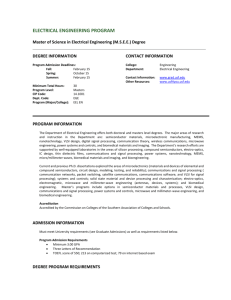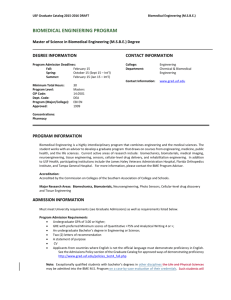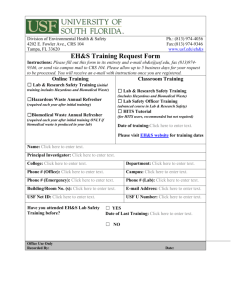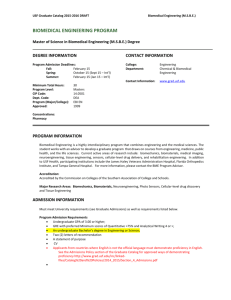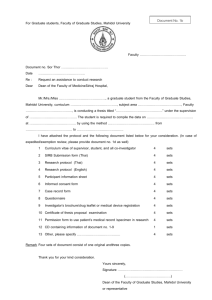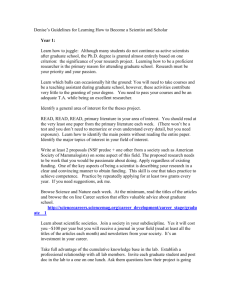Electrical Engineering program - USF Office of Graduate Studies
advertisement
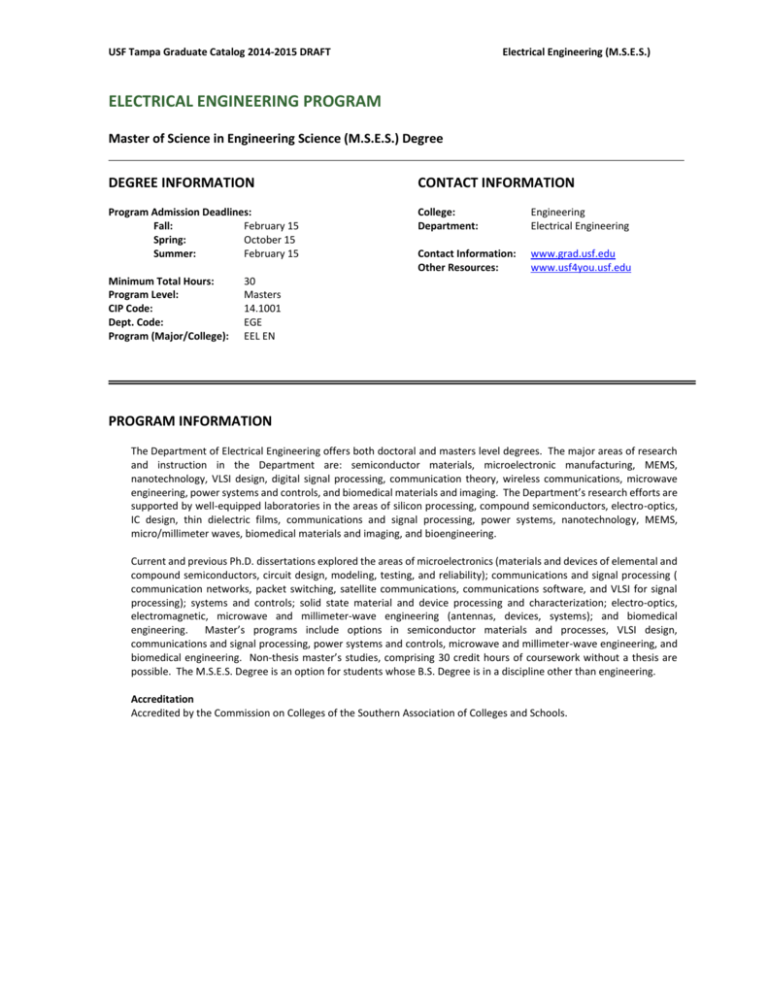
USF Tampa Graduate Catalog 2014-2015 DRAFT Electrical Engineering (M.S.E.S.) ELECTRICAL ENGINEERING PROGRAM Master of Science in Engineering Science (M.S.E.S.) Degree DEGREE INFORMATION CONTACT INFORMATION Program Admission Deadlines: Fall: February 15 Spring: October 15 Summer: February 15 College: Department: Engineering Electrical Engineering Contact Information: Other Resources: www.grad.usf.edu www.usf4you.usf.edu Minimum Total Hours: Program Level: CIP Code: Dept. Code: Program (Major/College): 30 Masters 14.1001 EGE EEL EN PROGRAM INFORMATION The Department of Electrical Engineering offers both doctoral and masters level degrees. The major areas of research and instruction in the Department are: semiconductor materials, microelectronic manufacturing, MEMS, nanotechnology, VLSI design, digital signal processing, communication theory, wireless communications, microwave engineering, power systems and controls, and biomedical materials and imaging. The Department’s research efforts are supported by well-equipped laboratories in the areas of silicon processing, compound semiconductors, electro-optics, IC design, thin dielectric films, communications and signal processing, power systems, nanotechnology, MEMS, micro/millimeter waves, biomedical materials and imaging, and bioengineering. Current and previous Ph.D. dissertations explored the areas of microelectronics (materials and devices of elemental and compound semiconductors, circuit design, modeling, testing, and reliability); communications and signal processing ( communication networks, packet switching, satellite communications, communications software, and VLSI for signal processing); systems and controls; solid state material and device processing and characterization; electro-optics, electromagnetic, microwave and millimeter-wave engineering (antennas, devices, systems); and biomedical engineering. Master’s programs include options in semiconductor materials and processes, VLSI design, communications and signal processing, power systems and controls, microwave and millimeter-wave engineering, and biomedical engineering. Non-thesis master’s studies, comprising 30 credit hours of coursework without a thesis are possible. The M.S.E.S. Degree is an option for students whose B.S. Degree is in a discipline other than engineering. Accreditation Accredited by the Commission on Colleges of the Southern Association of Colleges and Schools. USF Tampa Graduate Catalog 2014-2015 DRAFT Electrical Engineering (M.S.E.S.) ADMISSION INFORMATION Must meet University requirements (see Graduate Admissions) as well as requirements listed below. Program Admission Requirements Minimum 3.00 GPA Three Letters of Recommendation TOEFL score of 550; 213 on computerized test; 79 on internet based exam DEGREE PROGRAM REQUIREMENTS Total Minimuim Program Hours: 30 Thesis Option Required Courses 24 hours Include: Program Core below, 18 hours including 6 hours of depth or capstone coursework, and 6 hours of elective coursework. Required Thesis Hours 6 hours Total hours: 30 hours Course work only Required Courses 30 hours Include: Program Core below, 18 hours including 6 hours of depth or capstone coursework, and 12 hours of elective coursework. Total hours: 30 hours Program Core: 18 hours Students must take two of the following applied mathematics courses as part of the degree program: EGN 5421 Engineering Applications of Vector Analysis 3 EGN 5422 Engineering Applications of Partial Differential Equations 3 EGN 5423 Mathematics for Communications Engineering 3 EGN 5424 Engineering Applications of Complex Analysis 3 EGN 5425 Matrix Theory 3 EEL 6545 Random Processes 3 PHC 6050 Bio-Statistics 3 Students must take two of the following approved in depth sequences as part of their degree program*: EEL-6426 EEL-6486 EEL-5462 EEL-6935 EEL-6534 BME 6000 EEL-6935 EEL-6502 EEL-6597 EEE-5344 EEE-5382 EEE-6353 EEE 5356 EEE-6355 EEL-5631 RF/MW Circuits I and EEL-6427 RF/MW Circuits II EM Field Theory and EEL-6487 Adv. EM Field Theory or EEL-6481 Num. Techniques in Electromagnetics Antenna Theory and EEL-6463 Adv. Antenna Theory or EEL-6481 Num. Techniques in Electromagnetics Monolithic MW Circuits and EEL-6936 Adv. Monolithic MW Circuits Digital Communication Systems and EEL-6509 Satellite Comm. or EEL-6593 Mobile and Personal Com. Intro to Biomedical Eng. and GM-7930 Anatomy for Bio Engineers or EEL-6936 Bio Image Processing Bioelectricity and EEE-6273 Chemical and Bio Sensor Microsystems DSP-I and EEL-6752 DSP-II or EEL-6586 Speech Signal Processing Wireless Network Architecture and Protocols and EEL-6936 Adv. Topics in Wireless Comm. Digital CMOS VLSI Design and EEE-6936 VHDL or EEE-6936 Low Power VLSI Design Physical Basis of Microelectronics and EEE-6353 Semiconductor Device Theory I Semi-Conductor Device Theory I and EEE-6358 Semi-Conductor Device Theory II Integrated Circuit Technology and EEE-6936 Adv. Integrated Circuit Technology Compound Semiconductor Technology and EEE-6318 Characterization of Semiconductors Digital Control Systems and EEL-6613 Modern Control Theory USF Tampa Graduate Catalog 2014-2015 DRAFT Electrical Engineering (M.S.E.S.) EEE-6936 VHDL and EEL-6936 Rapid System Prototyping EEL-5250 Electric Power Systems I and EEL-6935 Electric Power Systems II EEL-6935 Industrial Power Distribution I and EEL-6936 Industrial Power Distribution II EEL-5935 Utility Power Distribution I and EEL-6935 Utility Power Distribution II EEL-6935 Electric Machines and Drives and EEL-6936 Power Electronics EEL-6425 Intro to Nanotechnology and EEL-6936 Nanotechnology II EEL-6935 Micro Electro Mechanical Systems I and EEL-6936 Micro Electro Mechanical Systems II *Other sequence must be approved by the graduate program director. Electives Minimum Elective Hours: Thesis Course work only: 6 hours 12 hours Students may adopt suggested electives from the department graduate handbook, by track or emphasis area of their choice. All courses must be graduate level. Students should refer to university requirements when choosing courses bearing in mind allowed quantities of 5xxx and 6xxx coursework. Special selections must be approved by the program coordinator. Comprehensive Exam The University requires all Master’s students to be assessed by a comprehensive examination. The department maintains two versions of this exam according to the student pathway to degree, i.e. Thesis or Non-Thesis as follows: Thesis students: Student’s written thesis and Public defense of same constitute the comprehensive exam. Student is provided a rubric that they will be assessed by relative to their written document and presentation. The committee reports this assessment to the department for final approval. Non-thesis students: The graduate program coordinator, with assistance from pertinent course instructors, form a committee to administer a comprehensive assessment of the student. This assessment is based on content from a capstone course in the primary area of study, content from a course in a secondary area of study and content from a core mathematics course Thesis EEL 6971 Thesis (6) COURSES See http://www.ugs.usf.edu/sab/sabs.cfm 6 hours USF Tampa Graduate Catalog 2014-2015 DRAFT Electrical Engineering (M.S.E.S.)
